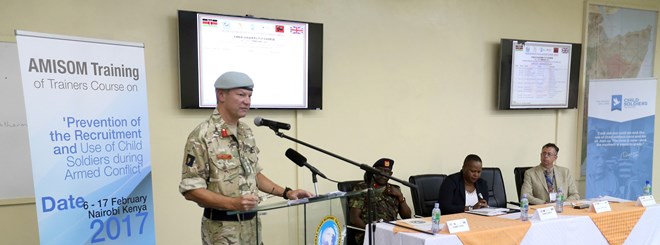
Sunday February 12, 2017

Colonel Richard Leakey, the Commandant British Peace Support Team-Eastern Africa, addresses participants during a Training of Trainers course on prevention of the recruitment and use of child soldiers in armed conflict. The training was held in Nairobi. AMISOM PHOTO
Nairobi AMISOM News – The African Union Mission in Somalia (AMISOM) and the Somali National Army (SNA) are putting in place measures to prevent the recruitment and use of child soldiers in armed conflict, due to increasing cases that are becoming a security challenge in the horn of Africa country.
In conjunction with the British Peace Support Team- East Africa (BPST-EA) and the Dallaire Initiative (DI), AMISOM is conducting a ten-day Training of Trainers (TOT) course for members of the Federal Government of Somalia (FGS) and selected AMISOM officials, to equip them with requisite skills to become rescuers of child soldiers in Somalia.
"We support and underscore our belief that the security sector actors have a particularly important role to play in protection of children because they are frequently the first point of contact not only with child soldiers but with all children in the operation areas," said Darin Reeves, the Training Director at Dallaire Initiative.
The AU deputy Special Representative for Somalia Hon. Lydia Wanyoto recommended going beyond international instruments of law, to save Somalia’s children from armed conflict.
"It’s not just about Somali children. It’s about humanity.
"It’s about an African child given a chance to grow up as a child to fulfil their rightful potential in life," she said in her remarks, during the official opening of the Training of Trainers course, in Kenya’s capital Nairobi, on Monday.
According to Musa Gbow, AMISOM’s Child Protection Advisor, participants will be equipped with skills to train their colleagues back in Somalia, on how to prevent the recruitment and use of child soldiers.
Col. Richard Leakey, the Commandant at British Peace Support Team -East Africa (BPST -EA), noted that AMISOM had a critical role in preventing future recruitment of child soldiers.
"For representing your country in AMISOM, you also have a personal opportunity to make a difference to individuals and communities in areas in which you serve," Col. Leakey stated.
"In the field, you will become key advocates to promote children’s rights.
"The reason for these are two fold, not only do you bear a heavy, moral responsibility to protect the innocent as AU peacekeepers, but also by breaking the cycle of conflict that continues due to recruitment and use of child soldiers, you will directly contribute to mission’s success," he told the participants at the training workshop.
Globally, various international instruments criminalize the recruitment and use of children in armed conflict.
According to the United Nations Security Council Report on Children and Armed Conflict in Somalia, which was published in January 2017, a total of 5933 boys and 230 girls were recruited as child soldiers between April 1, 2010 and July 1, 2016.
Statistics show an improvement between 2012 and 2014, but the figures sharply rise in 2016, where 1092 children were used as child soldiers, in the first half of 2016.
Available statistics also show that 70-percent of the children in armed conflict in Somalia are recruited by Al-Shabaab.
"Al-Shabaab used child soldiers to reinforce and replenish their ranks following successful AMISOM and SNA operations against them," Col. Leakey explains.
He said children as young as 9 years of age, are taught how to use weapons and sent to the frontline to use explosives, carry ammunition and to perform domestic chores.
"This means two things for you," Col. Leakey cautions.
"Firstly, by preventing child soldiers, you will help drain the recruitment pool for Al- Shabaab," he says.
"And secondly, you are likely to encounter child soldiers at some point during your deployment and you’ll need to know how to handle them humanely and with dignity, respect and professionalism."